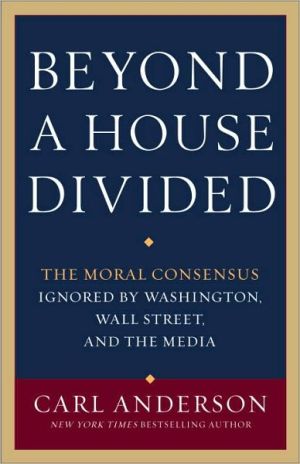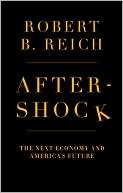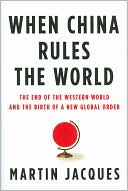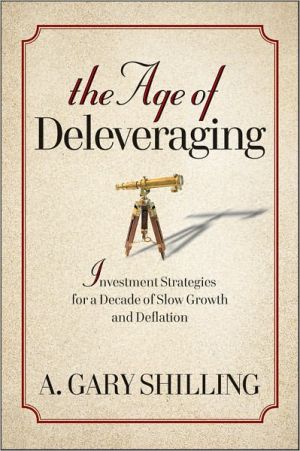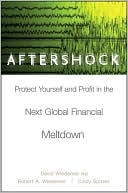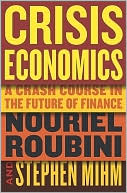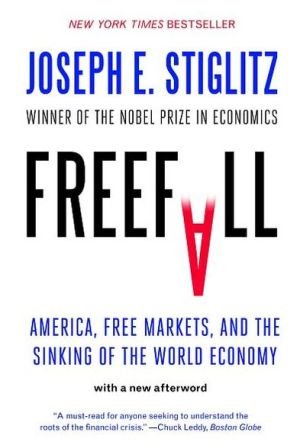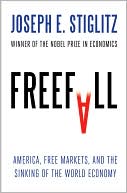Beyond a House Divided: The Moral Consensus Ignored by Washington, Wall Street, and the Media
For those who see America as a country at war with itself, divided red against blue, us against them, Carl Anderson explores what many have missed: statistical data showing an overwhelming consensus on many of the country's seemingly most divisive issues.\ In a radical departure from conventional wisdom, this book shares fresh polling data that indicates:\ Who Americans think Washington should listen to, and why\ Why we respect the moral leadership of charitable organizations and volunteers...
Search in google:
If you follow politics or the news, America is a country of culture wars and great divides, a partisan place of red states and blue states, of us against them. From pundits to politicians it seems that anyone with an audience sees a polarized country - a country at war with itself.In a radical departure from this "conventional wisdom," Carl Anderson explores what the talking heads have missed: an overwhelming American consensus on many of the country's seemingly most divisive issues. If the debates are shrill in public, he says, there is a quiet consensus in private - one that America's institutions ignore at their peril. From health care, to the role of religion in America, to abortion, to the importance of traditional ethics in business and society, Anderson uses fresh polling data and keen insight in BEYOND A HOUSE DIVIDED to show that a surprising consensus has emerged despite these debates. He sheds light on what's been missing in the public and political debates of the last several years: the consensus that isn't hard to find if you know where to look.For Anderson, allowing polar opposites to drive the discussion has made the resolution of contentious issues impossible. Instead, he says, we should look to the consensus among Americans as the best prospect for a beneficial conclusion.
Beyond a House Divided: Our Moral Compass\ \ As Americans, we all sense something’s wrong. Washington, Wall Street and the media all see it. Our religious leaders, our educators, our commentators all see it. America is unhappy, disillusioned and even angry. What Washington, Wall Street and the media are missing is that the target of the anger is not one party or one politician, it isn’t directed at one newspaper or television show, it isn’t ire at one hedge fund or another, it’s many things. We lack confidence in the trusted institutions that are the foundation of this country.\ Every year, new polls about trust come out that show how bad things have gotten. Congress is a perennial favorite, but recently bankers have sunk to new lows, joining the usual suspects such as lawyers and journalists. What does that say about us as a country when we’ve lost confidence in the institutions that should be guiding us, and we don’t think our country is headed in the right direction? A generation ago, the fictional character Howard Beale captured a similar mood in the film Network, when he faced the public and told them:\ I don’t have to tell you things are bad. Everybody knows things are bad. It’s a depression. Everybody’s out of work or scared of losing their job. The dollar buys a nickel’s worth; banks are going bust. . . . There’s nobody anywhere who seems to know what to do, and there’s no end to it.\ Thirty-four years later, Americans—by a two to one margin— think the country is headed in the wrong direction, according to a recent Bloomberg poll. Several other polls show a similar spread. And there is no need for Americans to be exhorted to follow Beale’s advice and “get mad” since 72 percent already agree with his statement, “I’m as mad as hell and I am not going to take it anymore,” according to polling in 2008 and 2009 by Frank Luntz. \ But anger isn’t the answer, especially for those of us who still believe in the power of America’s institutions to be a force for good in the greatest nation in history.\ After reading the headlines or hearing the debates in government, we might well conclude that as a nation we face an economic crisis, a financial crisis, a debt crisis, a war crisis, an immigration crisis, a healthcare crisis, a partisanship crisis, a regulatory crisis. But there’s another foundational crisis that most Americans believe exists—a moral crisis. \ When I began looking at and writing about moral issues in society and the morality of the marketplace in depth, the economic problems that began in 2008 were still a long way off. It was 2006 and 2007, and I was working on my book A Civilization of Love, in which I discussed economy from a global and personal business perspective, especially in the chapters about globalization and marketplace ethics. At the time, aside from the Enron scandal of some years before, there were no major market or nationwide wakeup calls to reexamine the economic climate. There were signs—but they were largely ignored. We were still in a stage in which, to borrow the observations of Jim Collins, negative data was prematurely discounted or explained away. We were in the high-point before the fall.\ What was a call to better business practices in 2007 sparked the following questions in 2008, especially in light of the market crash: how feasible is more ethical business? And what do Americans think of morality in the marketplace? Thus in 2008, working with Marist Polling Institute, the Knights of Columbus began work on our Moral Compass Project, with the goal of testing these views with the views of the American people.\ What we have found beginning in early 2009 and continuing to the present, was less a conflict of “sides” on issues, and more a consensus on motivations: the motivation which drives Americans day after day, the motivations which should—and should not guide business decisions, and the motivations of the nation as it faces some of the most difficult days of recent memory. In our project to track what’s important to the American people, we polled on the direction of our country’s moral compass. And what we found was that more than two-thirds of Americans believe the morality of the country is headed in the wrong direction.\ As Americans, we are disillusioned with the institutions that we traditionally look to for guidance in a time like this. Our polling shows that Americans believe each of the following institutions is moving the country in the wrong moral direction.\ • Politicians (82%)\ • Entertainment Industry (73%)\ • News Media (68%)\ • Federal Government (66%)\ • Business Executives (63%)\ • State and Local Governments (60%)\ • Lawyers (59%)\ • The Internet (52%)\ The majorities in most instances include at a minimum Independents and the majority of one or both parties. But perhaps most significantly, in many instances Republicans, Democrats and Independents are in accord.\ Many commentators suggest that the country is in the midst of what journalist Ronald Brownstein’s book recently called The Second Civil War. The effect of that war, the book’s subtitle says, is how extreme partisanship has paralyzed Washington and polarized America.\ But it’s not a problem of this segment of the population against that one. It has become a problem of a large consensus of the population at odds with governmental, media and financial institutions. Many Americans have come to believe these institutions don’t see problems the way that we do. Politicians and the media see a world of right and left. The American people see a world of right and wrong. It’s not a quaint idea, it’s a foundational one. President George Washington noted in his farewell address: \ It is substantially true that virtue or morality is a necessary spring of popular government. The rule, indeed, extends with more or less force to every species of free government. Who that is a sincere friend to it can look with indifference upon attempts to shake the foundation of the fabric?\ A Harris Poll in February 2010 found that Americans think— with more than 80 percent consensus—that big business, banks and financial institutions, lobbyists and political action committees all have too much power in influencing government policy in Washington. In addition, strong majorities—by more than 30 percentage points—agreed that the news media, entertainment and sports celebrities, and trial lawyers have too much influence. What institutions do strong majorities of Americans think have “too little” influence in Washington? By 54 to 35 percent, they say churches and religious groups. By 52 to 32 percent, they say racial minorities. By more than three to one they want non-profit organizations to have more influence, and by more than 20 to one (93 percent to four percent), they think small businesses should.\ What is particularly telling is that the American public wants its opinion taken into consideration. By 55 to 31 percent, Americans say opinion polls don’t have enough influence, and by more than six to one (82 percent to 13 percent), they say “public opinion” itself should have more influence.\ They don’t trust the officials who should be listening to public opinion in government, or those reporting on it in the media, but they do trust—overwhelmingly—the sense of the American people, and they want those opinions to be heard and acted upon. What do they see as moving the moral compass of the country in the right direction?\ Overwhelmingly, Americans respond with two answers: charitable organizations (61 percent) and volunteers (73 percent). Pluralities or slight majorities also indicate the U.S. military, families, law enforcement, private education and religious values are moving the country’s moral compass in the right direction. Disappointed by traditional institutions, Americans see altruism as the safe harbor for hope in the future. And we know what altruism is. According to our survey of Americans by generation, 67 percent have donated money to charity in the last year, and the same percentage indicated that they had volunteered their time in some way. Interestingly, even when simply asked if they had “volunteered for community service” in the past year, one-third said yes.13 That number doubles when people are given a list of activities and asked if they engage in any of them. It is as though volunteering is so engrained in their lives that they don’t even realize it is considered “volunteering.” It is—it seems— just what they do.\ Religion, too, is a common thread in the tapestry of American life. For Americans, the top two goals are to get married and have a family, and to be spiritual or get closer to God. This is a country, after all, where 84 percent believe in God.\ It’s also a country founded on religious principles, and whose greatest steps forward—the emancipation of slaves in the 19th century and the civil rights movement a century later—were both couched in religious terms. President Abraham Lincoln, for example, invoked God often during the Civil War—in his second inaugural address and in many letters. At Gettysburg, he made it clear that this nation was distinctly “under God.”\ The Reverend Martin Luther King, Jr. saw the same. Writing from a Birmingham jail just a couple of months shy of the 100th anniversary of the Battle of Gettysburg, he wrote: One day the South will know that when these disinherited children of God sat down at lunch counters, they were in reality standing up for what is best in the American dream and for the most sacred values in our Judaeo Christian heritage, thereby bringing our nation back to those great wells of democracy which were dug deep by the founding fathers in their formulation of the Constitution and the Declaration of Independence.\ Holding these values, most Americans agree on a fundamental truth: The country needs a moral compass in its public and private spheres. This should come as no surprise in a country in which our polling found nearly eight in 10 people hold religion to be an important part of their daily life—with well over half saying it’s “very” or “extremely” important.\ Some, like Boston College professor Alan Wolfe, have argued that:\ “. . . the old adage that America is a free country has, at last, come true, for Americans have come to accept the relevance of individual freedom, not only in their economic and political life, but in their moral life as well.”\ At first blush, some polling data would seem to support that. Our data showed that a slight majority of all Americans believe that morals are relative: In other words, there is no definite right and wrong. Such a self-opinion, however, belies Americans’ true views on issue after issue, for when asked specifically for their opinion on various moral issues—even when given the option of “not a moral issue”—a clear moral consensus emerges. On everything from marital infidelity to greed to abortion, Americans are clear—by large majorities—when they find something “morally wrong.”\ In fact, we found that three-quarters or more of Americans believe marriage, respect for others, and personal responsibility are all undervalued. More than two-thirds say the same of integrity, hard work and work ethic. Almost as many see the law and tolerance of others (both 64 percent), and concern for the less fortunate (62 percent) this way, and half or more say the same for belief in God (56 percent) and religious observance (54 percent). Americans see all of these as not valued enough in our society. Most seem united in adhering to the principles that made our nation great, and the moral compass that led to the overcoming of the evils of slavery and segregation. But overcoming those evils took both a moral compass and a capacity for partisans to forgive, to call each other to the “better angels of our nature,” as President Lincoln put it in his first inaugural.\ Four years later, at his second inaugural, President Lincoln concluded by saying:\ With malice toward none, with charity for all, with firmness in the right as God gives us to see the right, let us strive on to finish the work we are in, to bind up the nation’s wounds, to care for him who shall have borne the battle and for his widow and his orphan, to do all which may achieve and cherish a just and lasting peace among ourselves and with all nations.\ Americans seem to want to hear this message again. When one stops classifying people as interest groups and tries to understand how they exist as a community defined by their common values, the social landscape is not necessarily defined by factionalism. In fact, seen through the lens of moral consensus, a different picture emerges that tells us much more about the American character.\ On basic moral questions, on what they believe at their core, most Americans stand shoulder to shoulder. They agree that morality has a place not only in our families and personal relationships but also in corporate offices and boardrooms on Wall Street, in the country’s newsrooms and in the halls of political power in Washington.\ They want to look to family and religion for guidance in their lives. More than 75 percent think that hard work, integrity and education are the keys to personal success. It’s the same with topic after topic. Americans see personal integrity and hard work as the key in their own lives, and want to see strong ethics—at home, in politics and in business. As noted earlier, large majorities—a consensus in fact—think religious values have a proper place, and Americans of all political stripes see a moral crisis in American life. In short, polling—our own and that of other researchers—has found that leaving behind the procrustean bed of left and right, the great moral center of America speaks with far more unanimity than division and wants to make itself heard.\ But for some reason, it seems to Americans in general—and to those who follow news, business and politics in particular—that our leaders are not paying attention. We still live in a representative democracy, but those being represented seem to be the special interests, while the rest of us constitute a quiet consensus. The moral compass at the grassroots level shows us a way forward, but it will require our “institutions”—government, media, entertainment and financial—to have the courage to buck the forces of greed and special interests and to move ahead in a way that can mend the country, rather than simply provide the same old debates as if the mythical divisions between Americans actually exist.
Acknowledgments 7Foreword 91 Beyond a House Divided: Our Moral Compass 152 Beyond the Wall of Separation: Religion in America 273 Beyond Greed: Toward Morality in the Marketplace 434 Beyond Partisan Politics: Values-based Leadership 615 Beyond the Clash of Absolutes: Abortion 796 Beyond Mythology: The Statistics on Marriage 977 Beyond Red and Blue: What We Can Do for Our Country 119Notes 131
